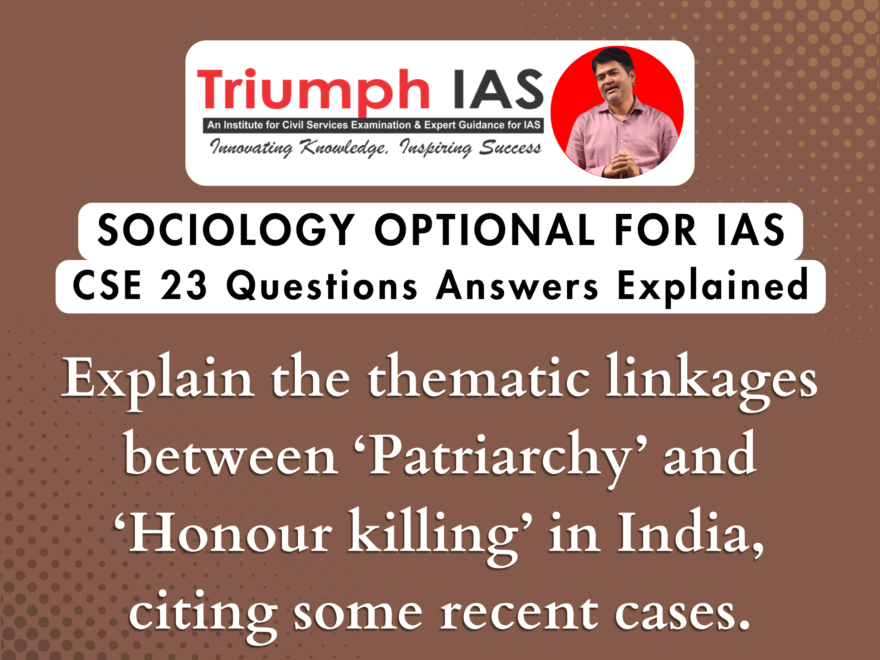Explain the thematic linkages between ‘Patriarchy’ and ‘Honour killing’ in India, citing some recent cases.
Section: B.
Sociology Paper 2023 Analysis.
Relevant for Paper-2 :
Systems of Kinship in India: Patriarchy, entitlements and sexual division of labour.
Question- 8 (A): Explain the thematic linkages between ‘Patriarchy’ and ‘Honour killing’ in India, citing some recent cases.
(20 Marks)
|
Introduction: Briefly explain honour killing Main Body: Highlight the linkages between patriarchy and honour killing by highlighting the concepts like women as gatekeeper of caste, Hegemonic masculinity, patriarchal bargain , traditional patriarchal authority etc. Conclusion:Need proper implementation of laws along with change in collective consciousness of patriarchal society |
- Honour killing is a form of violence against women committed with the motive of protecting or regaining the honour of the perpetrator, family, or community. Patriarchy and honour killings in India are interconnected through the deeply ingrained social norms and power structures that perpetuate gender inequality.
- Victims of honour violence are targeted because their actual or perceived behaviour is deemed to be shameful or to violate patriarchal norms. All of these abuses have the same roots, and those roots are patriarchy, misogyny, and inequality.
Main Body
Patriarchy and honour killing thematic linkages
- Patriarchal bargain and violation of norms: Patriarchy in India operates through a patriarchal bargain, where women are subordinated in exchange for protection and provision. However, when perceived violations of caste and patriarchal norms occur, especially in cases of inter-caste or inter-religious marriages, the patriarchal bargain can break down, leading to extreme consequences such as honour killings.
- Women as gatekeepers of caste: Leela Dube’s concept of women as gatekeepers of caste implies that women play a crucial role in maintaining caste boundaries and purity. When women are perceived to transgress these norms, it can result in severe consequences, including violence. Recent case of killing of Manoj Babali highlights these aspects.
- Male violence as a social structure: Sylvia Walby’s assertion that “male violence against women is sufficiently common and repetitive to constitute a social structure” is particularly relevant. Honour killings can be seen as a manifestation of this social structure, where violence against women becomes a normalized and accepted means of enforcing patriarchal and caste-based norms.
- The Kausalya and Shankar case (2016) in Tamil Nadu highlights the lethal consequences of defying patriarchal norms. Kausalya’s inter-caste marriage provoked a brutal attack by her own family, resulting in Shankar’s murder and Kausalya’s severe injuries
- Cultural beliefs and practices: Veena Das emphasizes the role of cultural beliefs in perpetuating violence against women. Deep-seated cultural norms that reinforce women’s inferiority contribute to practices such as honour killings. The cultural enslavement of women, seen through practices like dowry and child marriage, creates an environment conducive to violence against women.
- Gendering of caste in the arena of sexuality: Kalpana Kannaviran’s perspective on the gendering of caste highlights the regulation of female sexuality as a critical aspect. The desire to control and regulate female sexuality contributes to the occurrence of honour killings, particularly when women defy societal expectations regarding their relationships and marriages.
- Dominance of traditional authority over statutory norms : Uma Chakravorty’s observation that despite liberal legislations, the conditions of women remain unimproved is crucial. Cultural and patriarchal norms often dominate statutory norms, resulting in a disjuncture between legal frameworks and the lived experiences of women facing violence, including honor killings.
Conclusion
Kishwar and Vanita highlight the incompatibility between Indian constitutional law and the prevalent violence against women underscores the need for a comprehensive revaluation of legal frameworks. The clash between sociocultural norms and legal provisions contributes to the persistence of honour killings. Hence better implementation of legal provisions along with the change in collective consciousness based on patriarchal norms is required so that these issues can be solved.
Related Blogs…
To master these intricacies and fare well in the Sociology Optional Syllabus, aspiring sociologists might benefit from guidance by the Best Sociology Optional Teacher and participation in the Best Sociology Optional Coaching. These avenues provide comprehensive assistance, ensuring a solid understanding of sociology’s diverse methodologies and techniques.
META TAGS:
Taylorism, Scientific Management, Frederick Taylor, Efficiency, Standardization, Specialization, Worker Exploitation, Organizational Hierarchy, Merits and Demerits, Contemporary Organizational Functioning, Sociology Question Paper, Sociology Question Paper 2023, Sociology Question Paper CYQ, Sociology Question Paper UPSC, What is Taylorism? Analyze its merits and demerits.
Why Vikash Ranjan’s Classes for Sociology?
Proper guidance and assistance are required to learn the skill of interlinking current happenings with the conventional topics. VIKASH RANJAN SIR at TRIUMPH IAS guides students according to the Recent Trends of UPSC, making him the Best Sociology Teacher for Sociology Optional UPSC.
At Triumph IAS, the Best Sociology Optional Coaching platform, we not only provide the best study material and applied classes for Sociology for IAS but also conduct regular assignments and class tests to assess candidates’ writing skills and understanding of the subject.
Choose The Best Sociology Optional Teacher for IAS Preparation?
At the beginning of the journey for Civil Services Examination preparation, many students face a pivotal decision – selecting their optional subject. Questions such as “which optional subject is the best?” and “which optional subject is the most scoring?” frequently come to mind. Choosing the right optional subject, like choosing the best sociology optional teacher, is a subjective yet vital step that requires a thoughtful decision based on facts. A misstep in this crucial decision can indeed prove disastrous.
Ever since the exam pattern was revamped in 2013, the UPSC has eliminated the need for a second optional subject. Now, candidates have to choose only one optional subject for the UPSC Mains, which has two papers of 250 marks each. One of the compelling choices for many has been the sociology optional. However, it’s strongly advised to decide on your optional subject for mains well ahead of time to get sufficient time to complete the syllabus. After all, most students score similarly in General Studies Papers; it’s the score in the optional subject & essay that contributes significantly to the final selection.
“A sound strategy does not rely solely on the popular
Opinion of toppers or famous YouTubers cum teachers.”
It requires understanding one’s ability, interest, and the relevance of the subject, not just for the exam but also for life in general. Hence, when selecting the best sociology teacher, one must consider the usefulness of sociology optional coaching in General Studies, Essay, and Personality Test.
The choice of the optional subject should be based on objective criteria, such as the nature, scope, and size of the syllabus, uniformity and stability in the question pattern, relevance of the syllabic content in daily life in society, and the availability of study material and guidance. For example, choosing the best sociology optional coaching can ensure access to top-quality study materials and experienced teachers. Always remember, the approach of the UPSC optional subject differs from your academic studies of subjects. Therefore, before settling for sociology optional, you need to analyze the syllabus, previous years’ pattern, subject requirements (be it ideal, visionary, numerical, conceptual theoretical), and your comfort level with the subject.
This decision marks a critical point in your UPSC – CSE journey, potentially determining your success in a career in IAS/Civil Services. Therefore, it’s crucial to choose wisely, whether it’s the optional subject or the best sociology optional teacher. Always base your decision on accurate facts, and never let your emotional biases guide your choices. After all, the search for the best sociology optional coaching is about finding the perfect fit for your unique academic needs and aspirations.
Follow us :
🔎 https://www.instagram.com/triumphias
🔎 https://www.youtube.com/c/TriumphIAS
🔎 https://t.me/VikashRanjanSociology
Find More Blogs…
| Compare and contrast Karl Marx’s and Max weber’s | Karl Marx- Historical Materialism |
| Position of Women In the Modern Indian Society | Sociology: Social system and pattern variables |
KEYWORD: linkages between Patriarchy and Honour killing in India,linkages between Patriarchy and Honour killing in India,linkages between Patriarchy and Honour killing in India,linkages between Patriarchy and Honour killing in India,linkages between Patriarchy and Honour killing in India,linkages between Patriarchy and Honour killing in India,linkages between Patriarchy and Honour killing in India,linkages between Patriarchy and Honour killing in India,linkages between Patriarchy and Honour killing in India,linkages between Patriarchy and Honour killing in India,linkages between Patriarchy and Honour killing in India,


